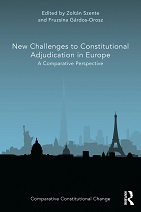edited by Zoltán Szente, Fruzsina Gárdos-Orosz (Routledge 2019, 350 pages)
About the book
In the past few years, constitutional courts have been presented with new challenges. The world financial crisis, the new wave of terrorism, mass migration and other country-specific problems have had wide-ranging effects on the old and embedded constitutional standards and judicial constructions. This book examines how, if at all, these unprecedented social, economic and political problems have affected constitutional review in Europe. As the courts’ response must conform with EU law and in some cases international law, analysis extends to the related jurisprudence of the European Court of Justice and the European Court of Human Rights. The collection adopts a common analytical structure to examine how the relevant challenges have been addressed in ten country specific case studies. Alongside these, constitutional experts frame the research within the theoretical understanding of the constitutional difficulties of the day in Europe. Finally, a comparative chapter examines the effects of multilevel constitutionalism and identifies general European trends.
This book will be essential reading for academics and researchers working in the areas of constitutional law, comparative law and jurisprudence.
About the series
Comparative Constitutional Change has developed into a distinct field of constitutional law. It encompasses the study of constitutions through the way they change and covers a wide scope of topics and methodologies. Books in this series include work on developments in the functions of the constitution, the organization of powers and the protection of rights, as well as research that focuses on formal amendment rules and the relation between constituent and constituted power. The series includes comparative approaches along with books that focus on single jurisdictions, and brings together research monographs and edited collections which allow the expression of different schools of thought. While the focus is primarily on law, where relevant the series may also include political science, historical, philosophical and empirical approaches that explore constitutional change.
